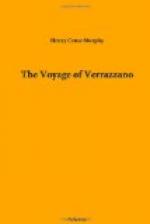The true history of Verrazzano, so far as known, is now to be given, in order to make a final disposition of this story. Nothing is preserved in relation to his early life. Even the year of his birth is matter of conjecture. He is called by Ramusio, Giovanni da Verrazzano, Florentine; and according to Pelli, was born about the year 1485, His father was Piero Andrea, son of Bernardo, the son of Bernardo of Verrazzano, a little town situated in the Val di Greve, near Florence,—the latter Bernardo having belonged to the magistracy of the priors in 1406. All that his eulogist was enabled to gather concerning him, beyond this brief genealogy, is taken from the Verrazzano letter and the discourse of Ramusio, relating how he was killed, roasted and devoured by the savages in a second voyage to America; [Footnote: The account which Ramusio gives of Verrazzano, and the manner of his death, occurs in his Discourse on Labrador, the Baccalaos and New France (vol. III fol. 41), in which, after reffering to the Cortereaes and Sebastian Cabot, he adds:
“There also sailed along the said land, in the year 1524, a great captain of the most Christian king in France, called Giovanni da Verrazzano, a Florentine; and he ran along all the coast, as far as Florida, as will be particularly seen by a letter of his, written to the said king, which alone we have been able to have, because the others have got astray in the troubles of the unfortunate city of Florence. And in the last voyage which he made, having wished to descend on the land with some companions, they were all put to death by those people, and in the presence of those who remained on board of the ship, were roasted and devoured. Such a wretched end had this valiant gentleman, who, had not this misfortune intervened, would, by the great knowledge and intelligence which he had of maritime affairs, and of navigation, accompanied and favoured by the immense liberality of King Francis, have discovered and made known to the world, all that part of the earth, up to the north pole, and would not have been contented with the Coast merely, but would have sought to penetrate far inland, and as far as he could go; and many, who have known and conversed with him, have told me, that he declared it was his intention to seek to persuade the most Christian King to send from these parts, a good number of people to settle in some places of said coast which are of temperate climate, and very fertile soil, with very beautiful rivers and harbors capable of holding any fleets. The settlers in these places would be the occasion of producing many good results, and among others of bringing those rude and ignorant tribes to divine worship, and to our most holy faith, and to show them how to cultivate the land, transporting some of the animals of our Europe to those vast plains; and finally, in time, having discovered the inland parts, and seen whether among the many islands existing there, any passage to the south sea exists, or whether the main land of Florida or the West Indies continues up to the pole. This and so much is what has been related of this so brave a gentleman, of whose toil and sweat, in order that his memory may not remain buried, and his name pass into oblivion, we have desired to give to the light the little that has come into our hands.”




